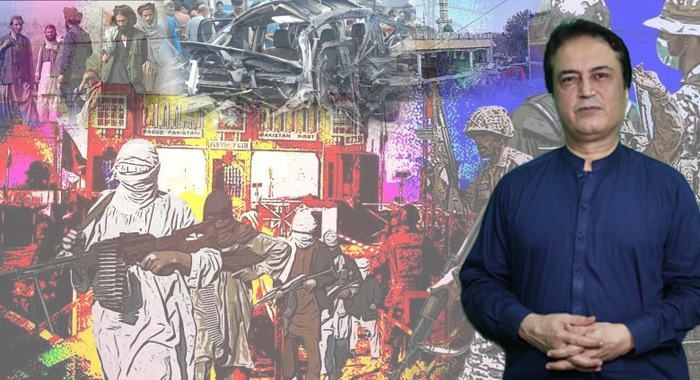Arif Yousafzai
The recent surge in terrorist attacks in Khyber Pakhtunkhwa (KP) is not an isolated spike in violence it is a symptom of a deepening crisis that exposes the paralysis of the provincial and federal governments in the face of a resurgent militancy. In just the past few days, 13 security personnel were martyred in Waziristan, and a devastating attack in Bajaur claimed the lives of the Assistant Commissioner and other officials. These targeted killings are not random; they are calculated moves by militant groups emboldened by weak governance and ambiguous state policy.
Since the beginning of counterterrorism operations in Pakistan, the Taliban specifically the Tehrik-e-Taliban Pakistan (TTP) have reorganised and regrouped.
Today, they are not merely operating in the shadows but are asserting themselves publicly. They have managed to create parallel zones of influence, particularly in southern districts like Dera Ismail Khan, where even the province’s top leadership fears venturing out in daylight.
This situation is not just about security lapses it reflects a profound failure of political will. The federal and provincial governments appear both unwilling and unable to confront the reality on the ground. The Prime Minister, the Governor, and Chief Minister of KP all from D.I. Khan cannot even visit their hometowns freely. The main Yarak Interchange, a critical point in D.I. Khan, recently witnessed Taliban presence, halting the vehicle of a prominent politician’s son. And this is no exception. Videos surface almost daily showing militants openly displaying weapons on highways, controlling checkpoints, and parading through streets — often greeted by chants from local children.
This disturbing normalisation of militancy signals not just a lapse in security but also a dangerous shift in social psyche one that the state has failed to counter. Religious and political groups, instead of taking principled stands, have chosen cowardly silence. Is it fear? Is it political expediency? Either way, it mirrors the fate of past progressive parties like the ANP and PPP, which were targeted for resisting extremism.
Governments are formed not just to hold office but to ensure the protection of lives and properties. When those in power fail to provide security, maintain public infrastructure, and protect law enforcement, they forfeit their moral and political right to rule. In Lucky Marwat, multiple attacks have taken place recently including one on a gas pipeline headed for Punjab not just to sabotage but to symbolically assert that the province’s resources are being held hostage.
It is no surprise that extremist recruitment is on the rise. TTP and similar organisations are seeing a surge in youth joining their ranks. Their messaging is clear, aggressive, and sadly, effective. Meanwhile, governments are offering no counter-narrative, no plan, and no presence on the ground. Militants move freely, control territory, and intimidate civilians while the so-called representatives of the people stay confined to their fortified compounds.
Adding insult to injury is the federal government’s renewed discussion on “reforms” in the tribal areas the same regions that were merged under FATA reforms. These decisions were made under international pressure, without groundwork, and without a comprehensive security plan. If today’s leaders be it Ameer Muqam or Faisal Kareem Kundi claim to represent the people, let them visit the tribal agencies. Let them walk through the streets of their own constituencies. Their absence speaks louder than their words.
The blame cannot be placed solely on militant groups. Daesh-Khorasan, TTP, and other factions are exploiting a vacuum. The real question is: who allowed this vacuum to grow? The provincial government has utterly failed in its fundamental duty to protect citizens. It has failed to defend police stations, government offices, and public spaces. It has failed to counter the ideological and material growth of militancy. And it has failed to be present, physically or politically, where the battle for peace is being waged.
If the current leadership both in Peshawar and Islamabad lacks the will to confront these realities, then they must resign. This is not merely a matter of politics; it is a matter of life and death. Every day that passes without decisive action strengthens the hand of those who wish to destabilise the province. Civilians, police, and civil servants are being killed. Explosions and target killings have become routine. If there are individuals with the courage, capacity, and clarity to restore peace, then let them lead. Let them talk, fight, negotiate but above all, let them act.
This is not the time for indecision or cowardice. It is the time for accountability, honesty, and courage. The people of Khyber Pakhtunkhwa deserve a government that stands with them — not one that hides from them.





